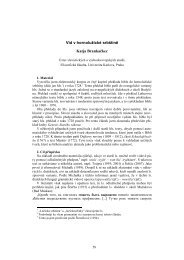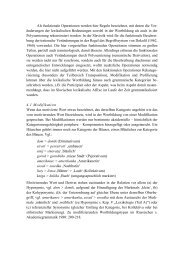Productivity of the verbal inflectional classes
Productivity of the verbal inflectional classes
Productivity of the verbal inflectional classes
Create successful ePaper yourself
Turn your PDF publications into a flip-book with our unique Google optimized e-Paper software.
156 Natalia GagarinaIn case <strong>of</strong> loan verbs <strong>the</strong> problem <strong>of</strong> incompatibility seems to be more salient. Each loan verb(or stem) has to receive a <strong>the</strong>matic suffix. The examples below are taken from computereseand technology internet chat-pages (an excellent source <strong>of</strong> neologisms), dictionaries <strong>of</strong> <strong>the</strong>new words and meanings (Levašov, 1984; Kotelova, 1989), and <strong>the</strong> author’s data collection 5 ,as well as from <strong>the</strong> o<strong>the</strong>r sources.(6) English to over-lock > overloč-it' (<strong>the</strong> indigenous alternation k//č) MC 3(7) English to use > jus-at‘ 6 MC 1 and perfective zajuza-t‘(8) English to format > two competitive forms format-it‘ MC 3 and format-irovat‘ MC 2 7and <strong>the</strong> creation <strong>of</strong> <strong>the</strong> perfective counter-pair format-nut’ with <strong>the</strong> additional meaning<strong>of</strong> expression.The incompatible properties which we observe in <strong>the</strong> groups <strong>of</strong> loan nouns and verbs may bedivided into <strong>the</strong> following groups:i) pure phonological, English foul [aω] > fol [o]ii) morphological (and almost always also phonological) with sub-types: (a) a one-to-onemapping when a given type <strong>of</strong> a loan word affix receives (or is substituted with) <strong>the</strong> givencorresponding indigenous affix, e.g. English nouns in –tion receive in Russian final –cija,German verbs in –ieren receive –irovat’ (<strong>the</strong> unfitting property –ieren <strong>of</strong> this group <strong>of</strong> <strong>the</strong>verbs has got <strong>the</strong> stable counterpart in Russian and, thus, cannot be considered ‘fullyincompatible’ any more. These loan verbs already fit into <strong>the</strong> receiving second MC, this wellestablishedpattern is used regularly for several centuries):(9) English falsification > fal’sifikacija, devaluation > deval’vacija(10) German kompostieren > kompostirovat’, klassifizieren > klassificirovat’, stimulieren >stimulirovat’(b) no one-to-one mapping, when <strong>the</strong> host system has to adopt <strong>the</strong> loan word on <strong>the</strong> basis <strong>of</strong>its phonological shape or by an indigenous word formation pattern: 8(11) English champion > (čempion) > čempion-it’, upgrade > apgrejd-it’, bobsleigh >(bobslej) > bobsleistcf. loan verb with preposition (12) 9 and perfectivization <strong>of</strong> <strong>the</strong> English verb to help (13):(12) English to hang up > s-hengap-i-t’-s’a (<strong>the</strong> complicated model <strong>of</strong> word formation: s-pure aspectual perfective suffix + -i- <strong>the</strong>matic vowel <strong>of</strong> <strong>the</strong> MC 3 + -s’a reflexivepostfix),5 Examples (6), (7) and (14) were suggested by Elena Andreeva in personal communication with <strong>the</strong> author.6 Note <strong>the</strong> choice <strong>of</strong> <strong>the</strong> rare –a-pattern. The verb jusit’ ‘to slide’, ‘to whirl on a slippery surface’ (about <strong>the</strong>wheels) exists already in Russian.7 The presence <strong>of</strong> variants may serve as an evidence for <strong>the</strong> crippling and loosing <strong>of</strong> codified norms.8 As it is more <strong>of</strong>ten <strong>the</strong> case with verbs.9 This (as well as <strong>the</strong> example (21)) is <strong>the</strong> highest level <strong>of</strong> <strong>the</strong> incompatibility which has to be overcome.




